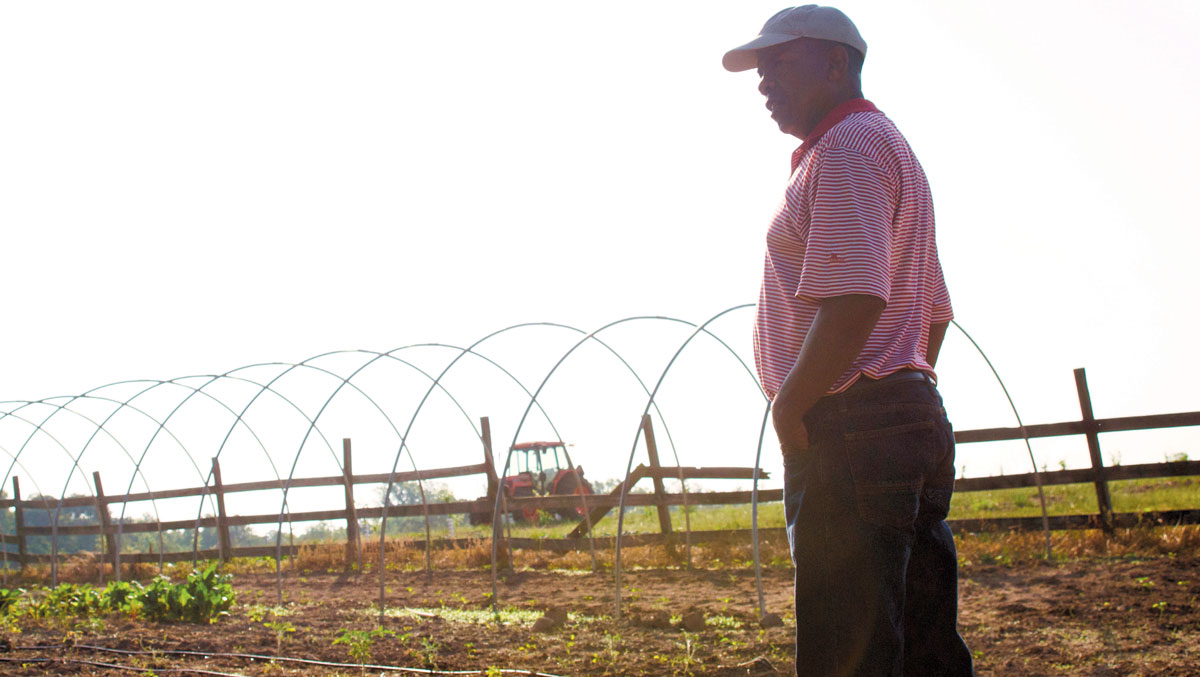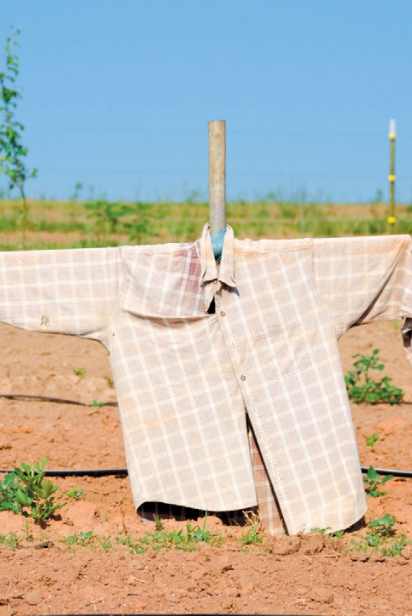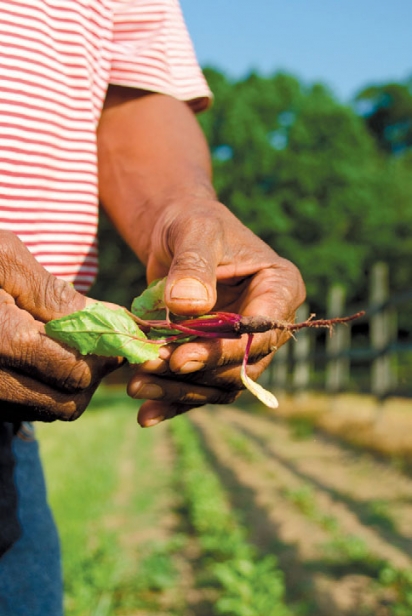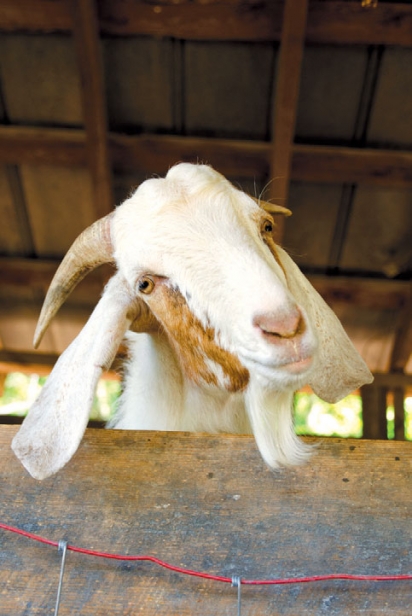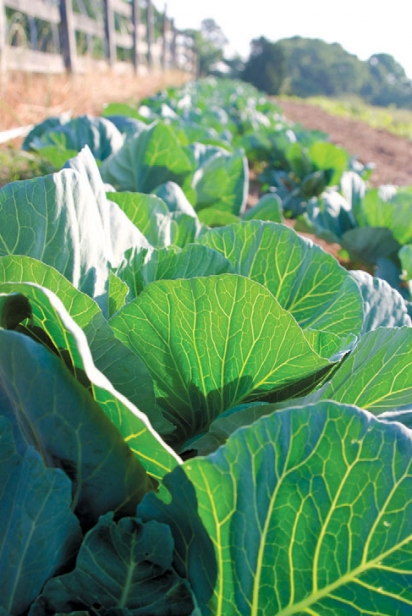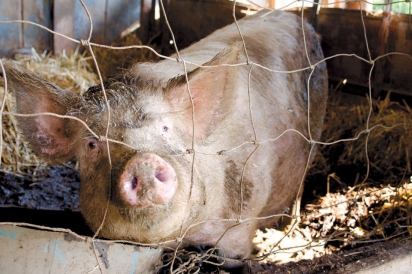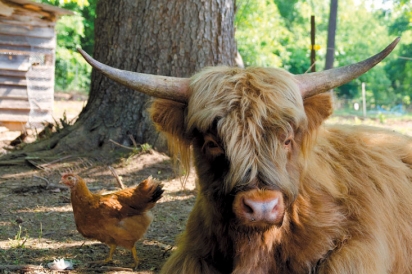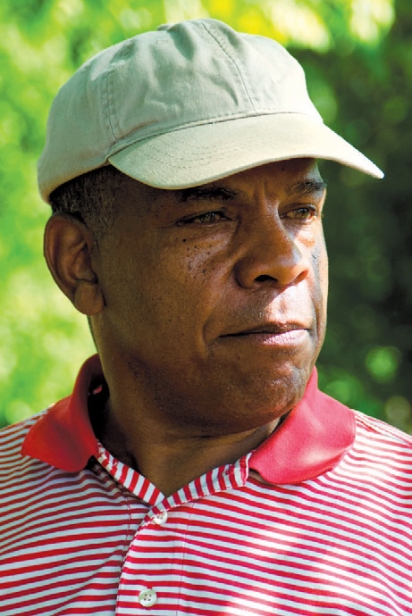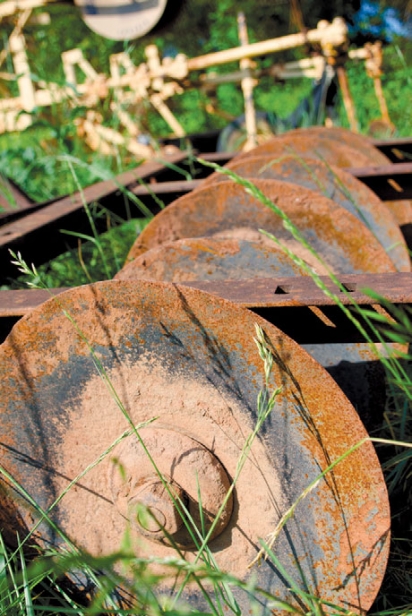Portrait of a Farmer
From The Good Earth
Robert Jackson of Jackson Farms II
After sitting down and talking with Lyman farmer, Robert Jackson, I’m reminded of a Super Bowl commercial I saw a few years ago—the one with Paul Harvey talking about how God made farmers. As I drove away from his home and toward my own, mulling over all the stories he so happily and generously told me, I couldn’t help but hear Harvey’s voice:
God said, I need somebody strong enough to clear trees and heave bales, yet gentle enough to tame lambs and wean pigs and tend the pink-combed pullets, who will stop his mower for an hour to splint the broken leg of a meadow lark. It had to be somebody who’d plow deep and straight and not cut corners; somebody to seed, weed, feed, breed and rake and disc and plow and plant and tie the fleece and strain the milk and replenish the self-feeder and finish a hard week’s work with a five-mile drive to church; somebody who would bale a family together with the soft strong bonds of sharing, who would laugh, and then sigh, and then reply, with smiling eyes, when his son says that he wants to spend his life “doing what dad does”—so God made a farmer.
Mr. Jackson and I met on a very rainy day, the weather keeping me from actually seeing his farm or his greenhouses, and our schedules keeping me from interviewing his son, Robert II, or his daughter-in-law, Toshiba. But, really, none of that mattered, as my problem wouldn’t be how to write this article, but rather how I could keep it under 2,000 words.
Jackson and I immediately made a connection. We talked about how he came to acquire his dining room table and chairs. We spoke of industrial farming, of family, of community. We even spoke of religion and politics, topics you typically avoid with strangers.
His large hands, which he can no longer feel due to nerve damage caused by an auto accident, gestured as he talked. And whenever he was making a serious point, they were folded and still on the table. A gentle soul, this farmer offered me snippets of memories from his life. And while I am typically quite hesitant to include such in articles, his stories compel me to include them. To understand Jackson Farms II in Lyman, one first must understand Robert Jackson, the man and farmer. Similarly, to understand the present or the future, often one must reconcile the past. Jackson’s story began with his birth.
Robert Jackson entered this world, all three pounds of him, to his mother, alone, in a house on his grandfather’s farm. His tiny body was placed in a shoebox and abandoned. After being found, his grandmother, who was half Cherokee, took his fevered body into the woods and performed some kind of ancient herbal remedy, giving him a fighting chance to live.
“To this day, no one knows what she did,” says Jackson. But something took, something worked, and perhaps his fate as someone continually drawn to and tied to the land was imprinted that day, amongst the flora and fauna of the forest and his grandmother’s skilled and tender hands.
He grew up on his grandfather’s farm on Route 7, not far from where Jackson Farms II is today. “At four years old, I knew what I wanted to do,” he says. He loved plants from an early age. He loved the smell of dirt in the spring when rains bring out the earthiness of clay. He learned all he knows from watching, then participating, with his grandfather in the upkeep of the farm.
“He taught me how to prune, and to this day, if I don’t prune how he taught me, it doesn’t work out right,” Jackson says.
The memories of growing up on his grandfather’s farm still bring a twinkle to his eyes: spying on his granddaddy and his friends as they gathered around the well at night to enjoy fellowship and maybe a sip or two of moonshine; witnessing one of those old men raking in $100 and a gallon of shine for winning a bet that he wouldn’t buck a goat; digging pits in the ground (cold framing); taunting his aunts as they tried to sneak back in the house after staying out too late (young, enterprising Jackson would charge them a dollar to come through the window); sneaking into the forbidden shed where his grandfather’s muscadine and cherry wines fermented in barrels and seeing a possum, who had broken through the cheesecloth barrier, floating face up in the barrel, both drunk and dead; the family meals around the table (his grandparents had 12 children of their own) and having to give up the best pieces of chicken to an uncle; watching and learning from his grandfather how to grow and raise enough to feed that many mouths.
“At the end of the day, that’s what farmers do—we feed the world,” says Jackson. “And farmers aren’t dummies. What other occupation has to be so many different occupations in one? The farmer has to be doctor, lawyer, marketer, developer, business man, salesman, customer service, mechanic, laborer, etc., etc., and skilled in all equally well.”
Jackson pursued his natural interests at Spartanburg Technical College (Spartanburg Community College), earning a degree in horticulture. “I had to learn the Latin names of plants, botany, chemistry, etymology,” says Jackson. And he ended up putting this knowledge to use with his first farm, which specialized in fruit trees—peaches and plums.
But after three consecutive years of damaging freezes, he cashed out and moved to Connecticut to work on two other farms.
“The saddest day of my life, other than my grandfather’s and grandmother’s deaths, was the day I had to give up my red tractor,” he says.
At one Connecticut farm, he helped grow a 20-acre operation into a 1000-plusacre behemoth. “In 2001, I decided that was my last year. I told my boss, ‘you got bigger, but I got smaller,’” he says. Jackson moved back home, got married, found a house, went to truck driving school, and rode the country for a year and a half.
“I got to see some interesting things driving the country,” he says. All the while, however, the earth was summoning him, and in his off time, he started gardening in his backyard.
“One day I called my wife from the road and told her to set up a stand in the front yard with ‘homegrown tomatoes for sale,’” says Jackson. The first day, they made nothing. The second day, they made $10. The third day, they made $50. “That’s when I decided to come on back home,” he says.
Jackson did just that, and he and his son, Robert II, who at the time was in college, rented a produce stand on Highway 29. But soon, renting the stand was not cost effective. The father-son pair found a 35-acre tract near the house, and Jackson Farms II was born.
Today, Jackson, his son, and his daughter-in-law grow and sell a large variety of produce, eggs and live animals, including peaches, plums, pluouts, cherries, blueberries, grapes, pears, blackberries, raspberries, apples, nectarines, watermelon and cantaloupe; onions, garlic, lettuces, zucchini, squash, beans, beets, kale, mustard greens, Swiss chard, carrots, tomatoes, peppers, cabbage, Crowder peas, cucumbers, corn, okra and eggplant; pigs, cows, roosters and chickens; as well as a variety of herbs and flowers.
The farm is very much a family affair; Jackson turned over everything to his son years ago, after a plague of health issues nearly killed him. “One morning I was walking out back with my dog, and we kept seeing dead birds everywhere,” says Jackson. “I picked them up so I could dispose of them. Several hours later, I wasn’t feeling too good, and I was pouring sweat. My aunt came to check on me, took my temperature, and it was 106.”
After being admitted to the hospital, it was discovered that Jackson had contracted avian flu. “With that fever, I was hallucinating,” he explains. “I saw my grandmother sitting in a chair under a tree surrounded by fields of brightly colored flowers. And she was saying, ‘That ol’ world’s done done enough to you. Come on home. Come on home.’ I really thought I was a goner that time.”
Just a couple of years ago, Jackson was the victim of a head-on automobile collision that caused severe nerve damage—a potentially catastrophic event to someone dependent upon his hands. But he didn’t let that stop him from doing what he loves.
He now focuses on his plantings and seedlings in the greenhouses behind his house. Robert II, who has worked with his father since he was four, earned an undergraduate degree in agricultural business and economics, and a master’s in agricultural education and extension. He runs the farm’s business operations (while still maintaining a full-time job at Kraft Foods). Toshiba, who also works at Kraft, applies her expertise in quality control to the farm operations and plans to use her background in product development to create edible, value-added products that bear the Jackson Farms II name. The couple’s dog, Sony, acts as chief of security and human resources, and can typically be found riding shotgun in the tractor or playing with fallen blueberries or cherry tomatoes.
Efficiency and diversification are defining traits of Jackson Farms II. The Jackson trio are the only workers of the 35-acre farm and solely responsible for not only the day-to-day operations, including the planting, tending, and harvesting, but the sales as well. “We keep labor costs down low; we have to work as close as we can,” says Jackson.
Jackson Farms II operates a produce stand in the front yard on 1789 Gap Creek Road in Lyman; they sell fruits, vegetables, herbs and flowers at the Hub City Farmers Market in Spartanburg, the Dräxlmaier Automotive Market in Duncan, and the TD Saturday Market in Greenville.
“We wholesale nothing,” says Jackson. “Your produce comes straight from our hands into yours.”
This focus on efficiency has just as much to do with Jackson’s family as it does with operations. “I want to make sure when I leave this earth that my son has a sustainable farm, so we run a tight operation,” he says. To this end, if Jackson Farms II produces any waste, it goes to the pigs. If produce doesn’t sell at the market, it goes to the local soup kitchen.
And having learned from his previous farms’ failure to the whims of Mother Nature, Jackson now focuses on diversity. He plans to add almonds and cashews, olives, pomegranates, lemons and limes to his harvest’s lineup. His family is planning to open a storefront in Greenville in the next two years. He is incorporating a fish farm where folks will be able to buy fresh tilapia. He is working on producing apple cider from the bounty of apples he grows. And he plans to open the farm for educational tours, to inspire children to become farmers themselves. “Years from now,” he says, “this community will have something really special.”
But, for now, Jackson is happy to nurture his seedlings, plan for the future, and tend to both farm and family…and dog.
And if you sit a spell with him, you just may learn something about how to grow corn in your suburban backyard, how to make the best potting soil using leaves and red worms, or maybe, perhaps, how to persevere despite obstacles, how to live a long, full life, how to continue a family’s legacy. And you may even learn a few things about yourself.
Jackson Farms II
1789 Gap Creek Road
Lyman
www.jacksonfarmsii.com


